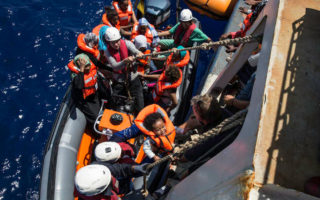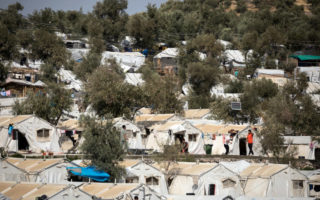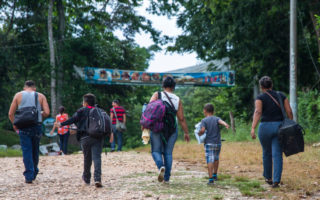
An Afghan boy stands in a hallway at a reception facility in the Italian city of Genoa. © UNHCR/Dario Bosio
Key challenges include discrimination, difficulty finding work, administrative bottlenecks and lack of legal information
ROME, Italy – The estimated 60,000 young refugees and migrants who arrived in Italy as unaccompanied children between 2014 and 2018, and who have since turned 18, require ongoing support to ensure their successful transition into adulthood, said UNICEF, UNHCR and IOM in a new report published today.
The report, At the crossroad: Unaccompanied and separated children in the transition to adulthood in Italy,highlights the ‘triple transition’ young refugees and migrants face when they turn 18 years old – from adolescence to adulthood, from living in one country to another, and through the emotional pain and trauma experienced when leaving home and during dangerous journeys.
“The difference between a 17-year-old refugee or migrant who fled conflict or violence and an 18-year-old who has lived through the same traumatic experience is negligible,” said Anna Riatti, UNICEF Country Coordinator for the Migration Programme in Italy. “The potential loss of continuous support for tens of thousands of young people – due to an artificial, age-based distinction, – will put them at further risk of social isolation, violence, abuse and an uncertain future.”
“Recognizing the complex nature of the children-adult distinction and acknowledging that persons coming of age have specific needs lies at the heart of this research,” said Roland Schilling, UNHCR Representative for Southern Europe. “Having a clearer understanding of the factors that favour or hinder a positive transition from being a refugee child to becoming an independent, self-reliant and resilient adult will help states step up their efforts to protect not only refugee children, but also their successful transition to adulthood.”
“The added value of this research is twofold: it highlights vulnerabilities and risks of unaccompanied and separated children during their transition to adulthood, and at the same time emphasizes their strengths, ability to take action and resilience, as well as their potential. Additionally, this research draws attention to the best practices to disseminate,” said Laurence Hart, Director of the IOM Coordination Office for the Mediterranean.
The new report outlines factors that hinder young refugees and migrants’ transition into adulthood. These include slow and complex procedures to obtain legal documents; discrimination and racism; difficulty in accessing education and training and finding work; overcoming emotional trauma as well as the risk of violence, particularly for girls.
Factors supporting young refugees and migrants during this critical time in life include positive relationships with peers and guardians; access to school, vocational training and employment opportunities, as well as safe and adequate housing.
In the report, the three UN Agencies provide key recommendations to Italian authorities and the European Commission:
Recommendations to Italian Authorities
- Adopt an inter-sectorial national strategy to increase social inclusion for young refugees and migrants who have recently turned 18, as well a National Action Plan against racism, xenophobia and discrimination.
- Ensure the full implementation of Law no. 47/2017 on protection measures for UASC.
- Ensure young people have access to psycho-social support, health care, education, gender-based violence prevention and response, training and employment services.
- Provide information to young people on the dangers of getting involved in informal and illegal activities such as trafficking and sexual exploitation.
- Accelerate procedures to recognise foreign qualifications.
- Increase participation of young refugees and migrants in social and recreational activities.
Recommendations to the European Commission
- Facilitate effective cooperation between Member States in assessing the best interests of every child, and in implementing family reunification procedures
- Establish a system to collect accurate data and information on current and former unaccompanied and separated refugee and migrant children to strengthen protection systems.
- Earmark resources under the upcoming EC Asylum and Migration Fund to strengthen and scale up the good practices identified in this report.
Between 2014 and 2018, more than 70,000 unaccompanied and separated refugee and migrant children arrived in Italy by sea, 90 per cent of whom were between ages 15 and 17. It is estimated that at least 60,000 have turned 18 in the past five years.
###
Note to Editor
At the crossroad. Unaccompanied and separated children in the transition to adulthood in Italy was commissioned by UNICEF, UNHCR and IOM. The research was carried out by the ISMU Foundation in collaboration with University of Roma Tre and University of Catania. The research focuses three regions of Italy that have received, or continue to receive, large numbers of young unaccompanied and separated refugees and migrants – Sicily, Lombardy and Latium.
About IOM
Established in 1951, IOM is the leading UN-related agency in the field of migration and works closely with governmental, intergovernmental and non-governmental partners. IOM works to help ensure the orderly and humane management of migration, to promote international cooperation on migration issues, to assist in the search for practical solutions to migration problems and to provide humanitarian assistance to migrants in need, including refugees and internally displaced people.
About UNHCR
UNHCR, the UN Refugee Agency, leads international action to protect people forced to flee their homes because of conflict and persecution. We deliver life-saving assistance such as shelter, food and water, help safeguard fundamental human rights, and develop solutions that ensure people have a safe place to call home where they can build a better future. We also work to ensure that stateless people are granted a nationality.
For more information about UNHCR, visit https://www.unhcr.org/about-us.html
About UNICEF
UNICEF works in some of the world’s toughest places, to reach the world’s most disadvantaged children. Across more than 190 countries and territories, we work for every child, everywhere, to build a better world for everyone.
Follow UNICEF Europe and Central Asia on Twitter and Facebook.
For additional information, please contact:
UNICEF Europe and Central Asia: Melanie Sharpe msharpe@unicef.org +41798347401
IOM in Geneva: Safa Msehli smsehli@iom.int +41794035526
UNHCR: Elizabeth Throssell, throssel@unhcr.org + 417933775
Originally published on UNHCR on 08 November 2019





